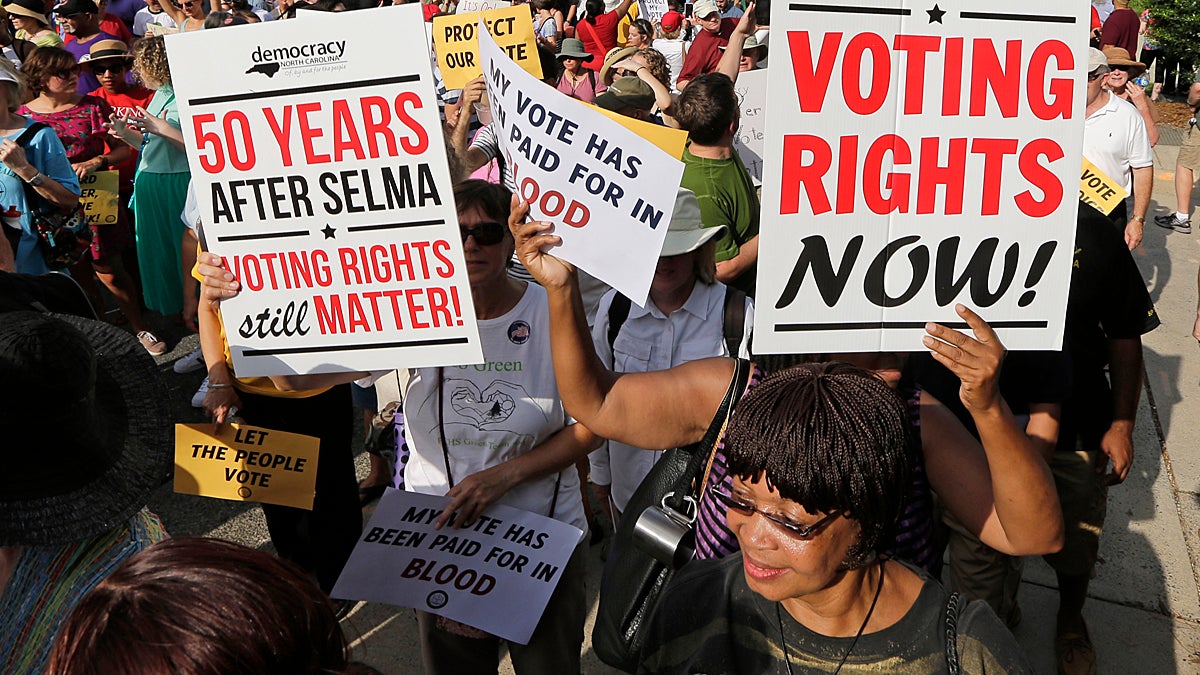Celebrating and mourning 50 years of the Voting Rights Act
Listen
Demonstrators march through the streets of Winston-Salem, N.C., Monday, July 13, 2015, after the beginning of a federal voting rights trial challenging a 2013 state law. Election law experts say the case could determine how far Southern states can change voting rules after the nation's highest court struck down a portion of the federal Voting Rights Act just weeks before the North Carolina law was passed. (Chuck Burton/AP Photo)
I want to be proud on this, the 50th anniversary of the Voting Rights Act of 1965, but I can’t.
Not while mourning I’m the untimely demise of all that the Voting Rights Act represents.
I mourn because just 27 percent of eligible voters participated in Philadelphia’s mayoral primaries. I mourn because we’ve been lulled into believing that the struggle for the vote is over.
I mourn, most of all, because these sad truths have emerged as a result of our apathy.
It wasn’t always this way. When discriminatory practices like poll taxes and literacy tests were used as state sanctioned tools to keep from voting, we fought, bled, and died to gain that basic right.
Under the Voting Rights Act, we achieved it. Black voter registration and turnout soared. So did the number of black elected officials, culminating in the 2008 election of the nation’s first black president. But in the 2013 Supreme Court decision that declared a key provision of the Voting Rights Act unconstitutional, Chief Justice John Roberts said the Voting Rights Act had done its job, and federal oversight was no longer needed.
However, when the law was changed, new discriminatory practices replaced those that Roberts claimed had been eradicated.
Instead of poll taxes and literacy tests, states like Texas and North Carolina instituted restrictive Voter ID laws–laws that disproportionately affected African Americans, Latinos, and those living in poverty.
And while I appreciate that a federal appeals panel recently ruled that the Texas voter ID law was discriminatory, and violated the Voting Rights Act, such laws aren’t the only things that disenfranchise African Americans.
In state and local elections, especially, too many of us disenfranchise ourselves.
When blacks don’t participate in the electoral system, because we believe that our vote changes nothing, we disrespect those who shed their blood on the Edmund Pettis Bridge while marching through Selma for the vote.
When blacks don’t participate in the electoral system because we believe that a moment in the voting booth is an inconvenience to be avoided, we forget the sacrifice of those who died for that fundamental right.
But more than remembering the past, our duty to vote is about preserving the future. Because when blacks don’t vote, we deny our children their legacy. We tell them that black lives don’t matter.
The black community can lament the demise of the Voting Rights Act, but if we don’t vote, we are sanctioning that decision. We can decry the pattern of police abuse against people of color, but if we don’t vote, we are signaling our approval. We can fight against the lack of funding for public school systems across the nation, but if we don’t vote, we are leaving our most potent weapon out of the battle.
Yes, the Supreme Court scuttled the Voting Rights Act, and yes, President Obama has spoken out against the court’s actions, just as he should have done.
But if we are to truly recognize the importance of the Voting Rights Act, we cannot depend on the President to speak out for us. We must speak out for ourselves, and we must do so with one simple action.
Vote.
WHYY is your source for fact-based, in-depth journalism and information. As a nonprofit organization, we rely on financial support from readers like you. Please give today.


